‘Growing Kopi, Drinking Qahwa; Stories of Coffee in Qatar and Indonesia’, described as the longest-ever exhibition about Indonesia to be held in Qatar, opened Monday at the National Museum of Qatar (NMoQ).
The exhibition, which will be on view until February 17, 2024, portrays the global history of coffee cultivation, trade, and consumption as it highlights the enduring and evolving coffee cultures of Qatar and Indonesia.
The show features engaging interactive displays, immersive projections, multi-sensory experiences that combine visuals, scents, and audio, alongside specially crafted contemporary artworks, among other elements.
Part of the event includes a five-day coffee-tasting activity, introducing a variety of coffee beans from Indonesia; and an exhibit of various batik designs, which serve as a symbol of Indonesian identity.
In a press statement, NMoQ director HE Sheikh Abdulaziz al-Thani said: “The Qatar – Indonesia 2023 Year of Culture is a testament to the power of shared narratives in fostering understanding and collaboration, something we see come through quite clearly through the 'Growing Kopi, Drinking Qahwa' exhibition.
“That extends to our shared traditions of hospitality, dialogue and creativity fueled by the practice of brewing, serving and sharing coffee. NMoQ is proud to host this milestone exhibition for the Qatar – Indonesia 2023 Year of Culture, which was created in partnership with the National Museum of Indonesia, the Embassy of Indonesia in Qatar, students who participated through the Ajial Altarbwy Centre, and Qatar Museums internship programme participants.”
The exhibition is a collaborative effort between the curatorial teams of NMoQ and the National Museum of Indonesia. This included Dr Marie-Pierre Lissoir, a specialist in Exhibits and Multimedia Interpretation; Najma Ahmed, a researcher in Social and Oral History; Tania Abdulmonem al-Majid, deputy director of Curatorial; Sara Saqr al-Mohannadi, associate curator of Social History; Sara al-Maadheed, associate curator of Oral History; Amal al-Hideous, head curator of Oral History; along with Sheikha Rawdha al-Thani, an oral history researcher from Qatar; and members from the National Museum of Indonesia, namely Handoko Hendroyono, Daroe Handojo, Prawoto Indarto, Sekar Arum Romadhani, and Nusi Lisabilla Estudiantin.
Speaking to reporters on the sidelines of the event, Indonesian ambassador Ridwan Hassan said: “Coffee has a very important role in connecting people from different cultures, and also connecting the rest of the world.
"The event not only because it signifies collaboration between Indonesia and Qatar, but also holds the potential to foster greater mutual understanding among people worldwide. Coffee, as a symbol, represents humanity itself.
“In Indonesia, the preparation and consumption of coffee involve particular processes and rituals, typically accompanied by the act of socialising, sharing stories, and building connections with loved ones and friends,” said Hassan, who was joined by Prof Mohamed Adlin Sila, expert staff to the Minister of Education and Culture of Indonesia.
According to Qatar Museums, Expo 2023 Doha plays a key role as the lead sponsor in making the exhibition possible, with further support from Partner & Partners.
“Through this partnership with Years of Culture, Expo 2023 Doha aims to solidify Qatar’s position as a global tourist destination. This exhibition is a testament to the power of co-operation in curating narratives that resonate across cultures and generations,” Expo 2023 Doha secretary general Mohammed al-Khouri said.
The exhibition is divided into five sections, which cover the journey from coffee cultivation to consumption as part of shared traditions, in addition to topics about sustainable farming practices and cultural development.
The ‘What is Coffee?’, section provides visitors with a wealth of information about the coffee plant and its beans. It details the origins of the term kopi (coffee in Bahasa Indonesia) from the Arabic word for coffee, qahwa.
In the ‘Cultivation and Trade of Coffee’ section, the spotlight is on the historical significance of coffee in the Arab world and Indonesia, explaining the journey of coffee from the forests of Ethiopia to the island of Java in Indonesia. This segment also showcases a contemporary art installation, titled ‘Bloom in Agony (2022)’ by the Indonesian artists' collective Gegerboyo, exploring the connections between Indonesia's colonial past and contemporary coffee culture.
The ‘Roasting and Brewing section gives visitors an opportunity to learn about qahwa brewing from a Qatari coffee expert through videos, as well as enjoy a coffee-making competition that reveals the unique recipes of different Qatari families.
The ‘Serving and Drinking’ section features some of the ceremonies linked to coffee drinking in Qatar and Indonesia, especially the 360-degree projection that takes visitors to Filosofi Kopi, described as “an iconic coffee shop in the heart of Jakarta.” A circular space that portrays a Qatari majlis screens a short film created in partnership with Qatari youth, underlining the intricacies of coffee serving and drinking etiquette in Qatar, often with humorous outcomes.
The last section, ‘Coffee and Creativity’, examines the various ways in which coffee plays a role in nurturing creativity within individuals and industries in both Qatar and Indonesia. It underscores Indonesian cultural traditions such as batik textiles and traditional mask dances, while also celebrating the talents and innovation of Qatari artists and entrepreneurs.
As part of the exhibition, a lecture on Qatar and Indonesia’s coffee culture will take place tomorrow (October 25) at NMoQ from 5pm to 7pm, exploring the unique traditions and captivating stories from these diverse nations.
Talented baristas in Qatar will have the chance to showcase their skills and coffee artistry in a brewing and storytelling competition on October 28 from 3pm to 7pm.
A unique tour will be held from October 30-31 (1pm-2.30pm for English and 4pm-5:30pm for Arabic), giving participants the chance to learn about the history of Arabic coffee as well as the traditions, necessary equipment and rituals related to preparing and serving the qahwa in Qatar.
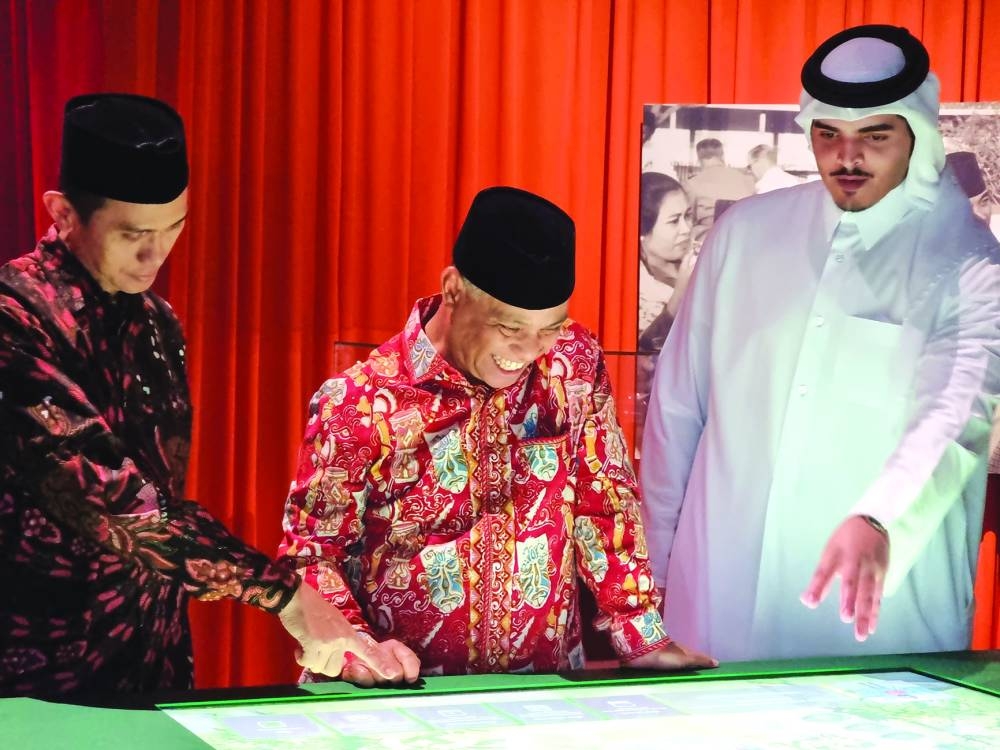
(from left) Prof Mohamed Adlin Sila, Indonesian ambassador Ridwan Hassan, and NMoQ director HE Sheikh Abdulaziz al-Thani at the opening of ‘Growing Kopi, Drinking Qahwa; Stories of Coffee in Qatar and Indonesia’ exhibition Monday at NMoQ. PICTURE: Joey Aguilar
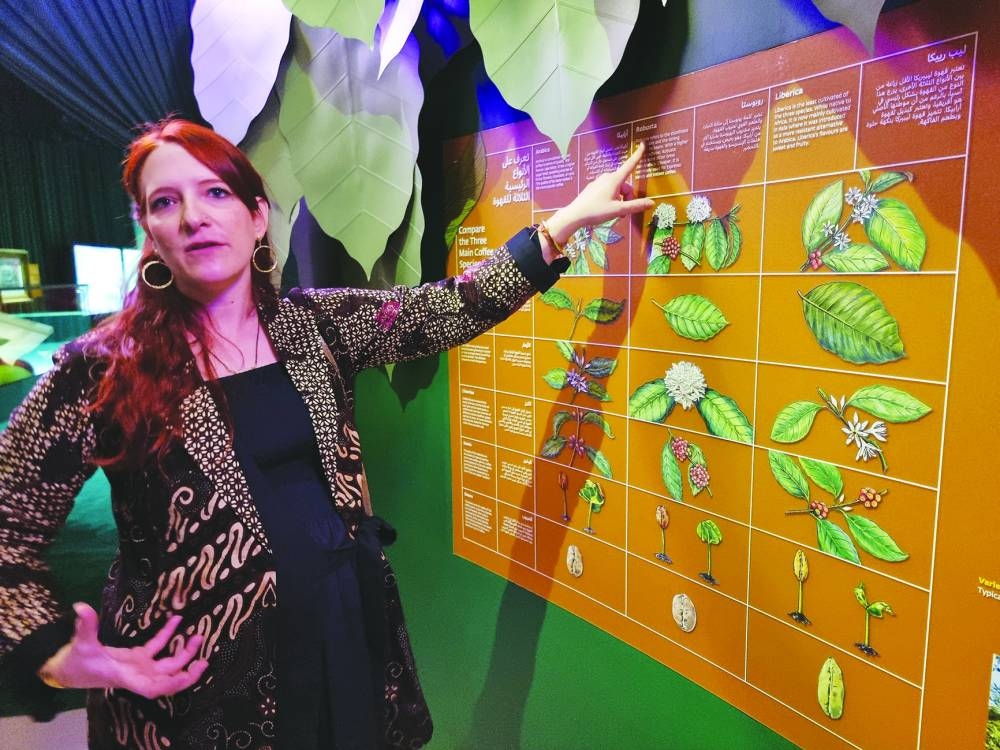
Dr Marie-Pierre Lissoir briefs journalists at the exhibition Monday at NMoQ. PICTURE: Joey Aguilar
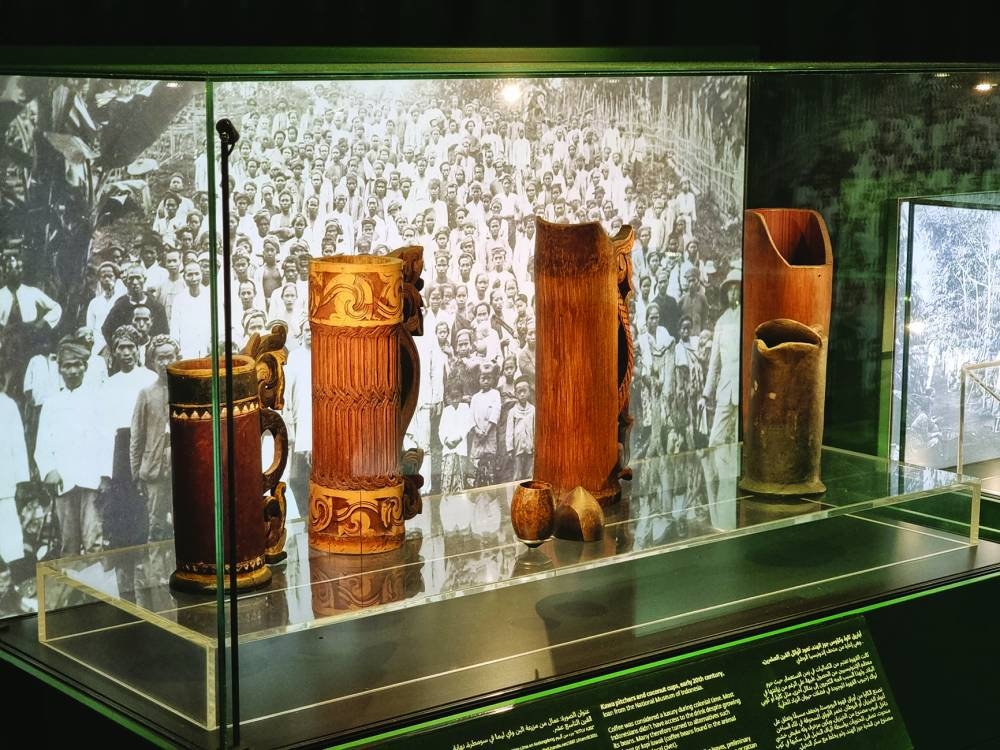
PICTURE: Joey Aguilar
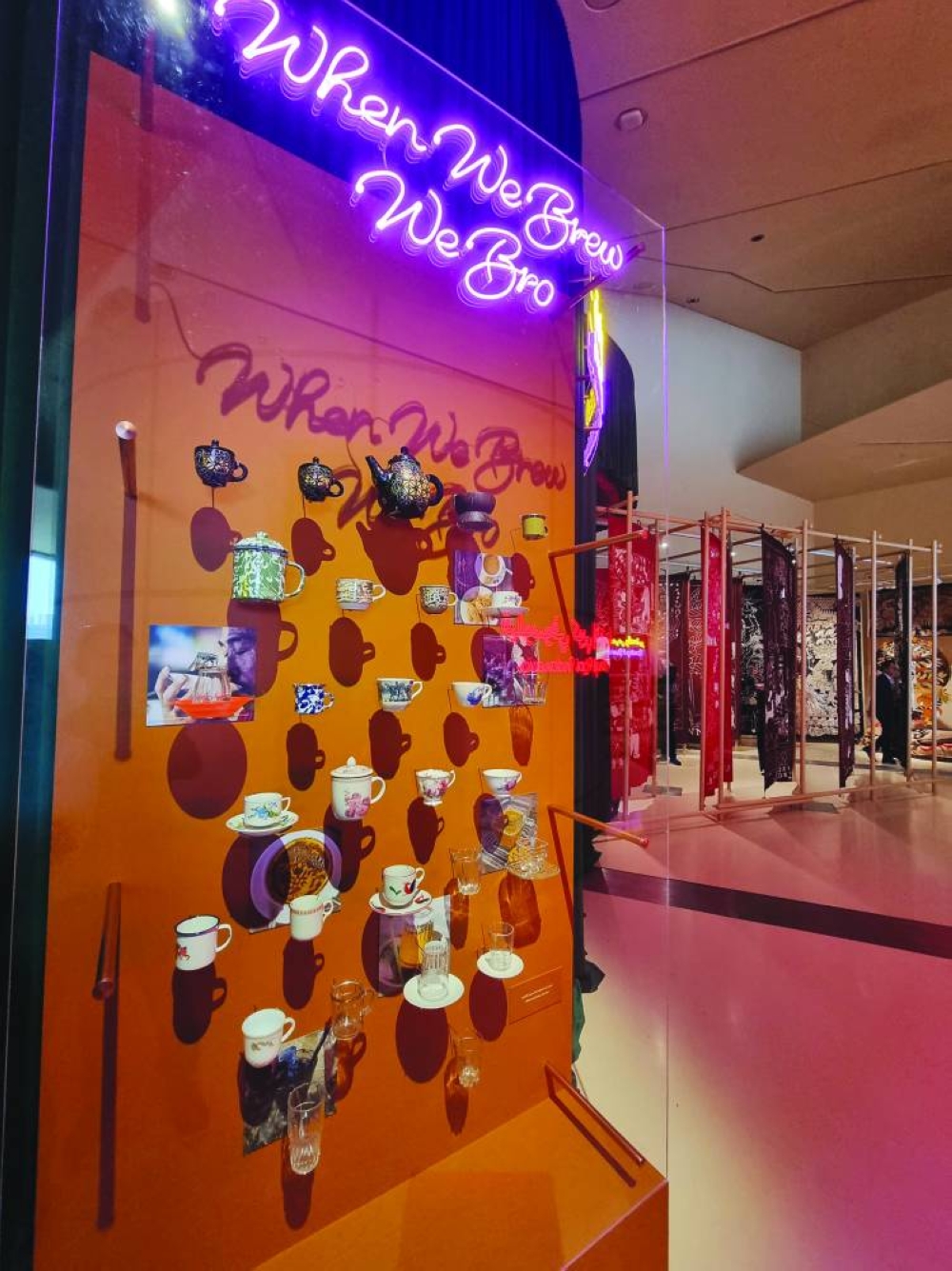
PICTURE: Joey Aguilar
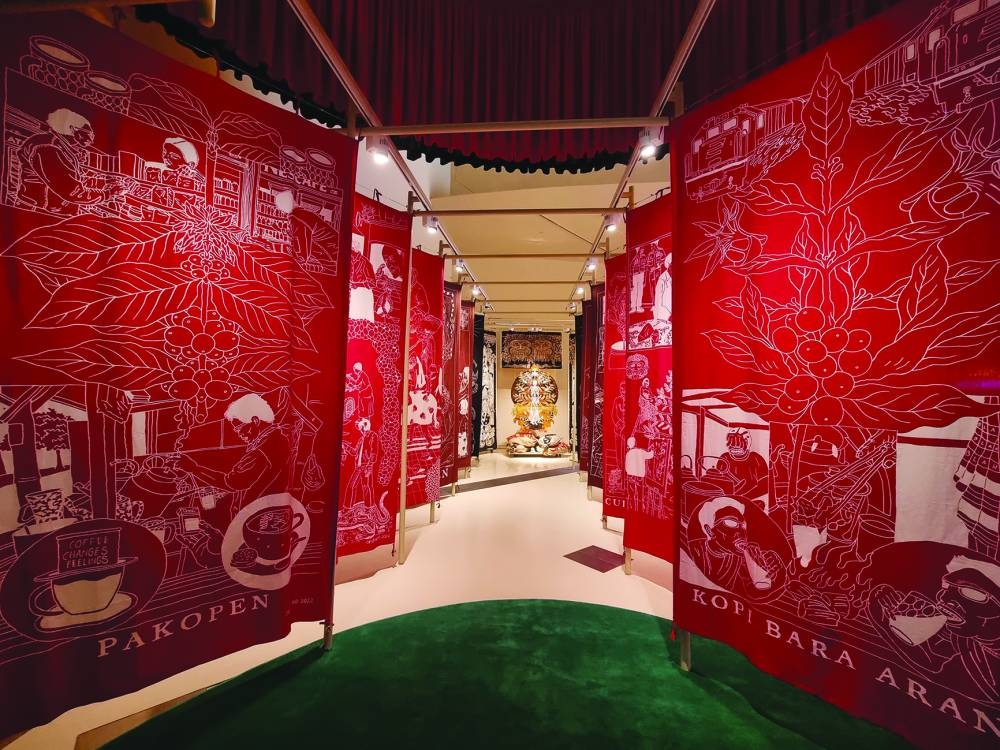
PICTURE: Joey Aguilar
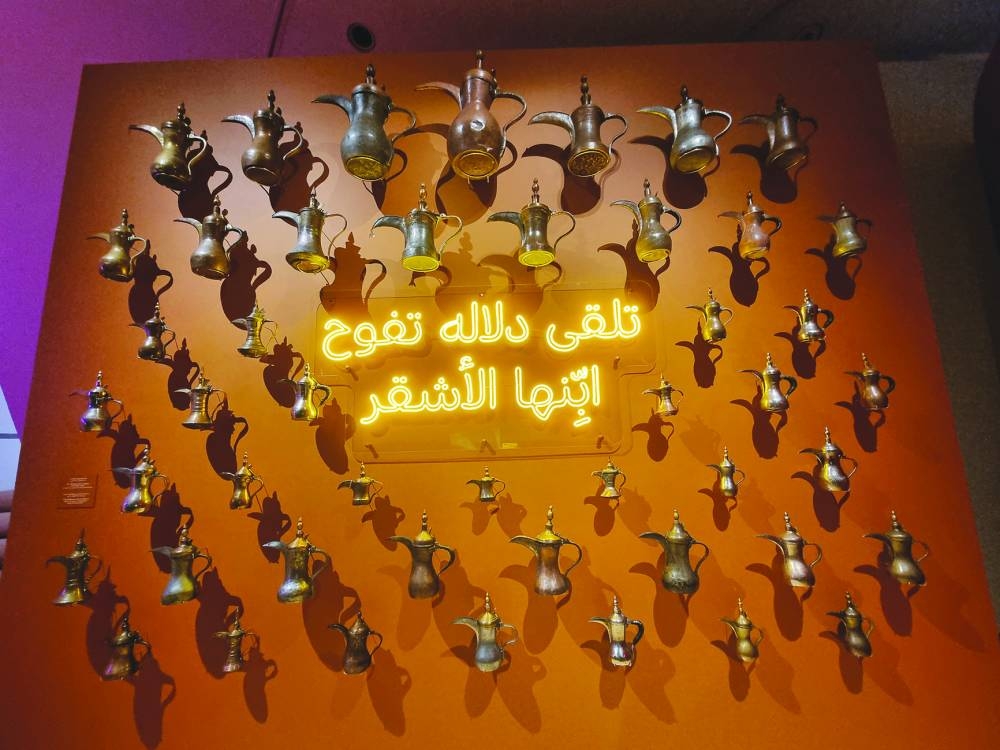
PICTURE: Joey Aguilar
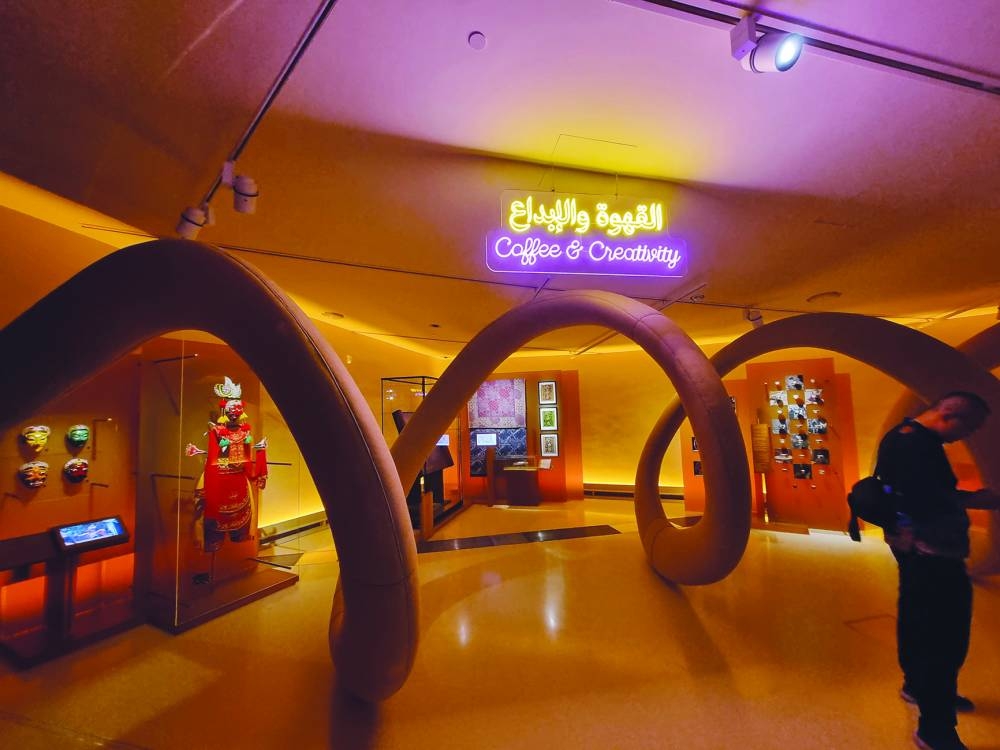
Divided into five sections, the exhibition features engaging interactive displays, immersive projections, and multi-sensory experiences that combine visuals, scents, and audio, alongside specially crafted contemporary artworks, among other elements. PICTURE: Joey Aguilar

